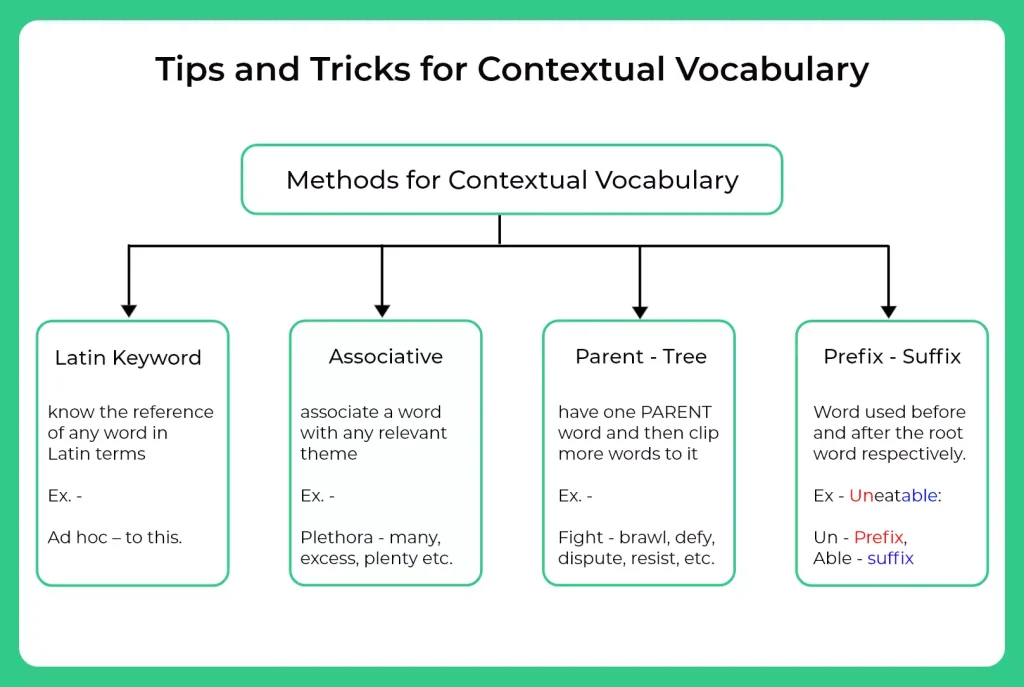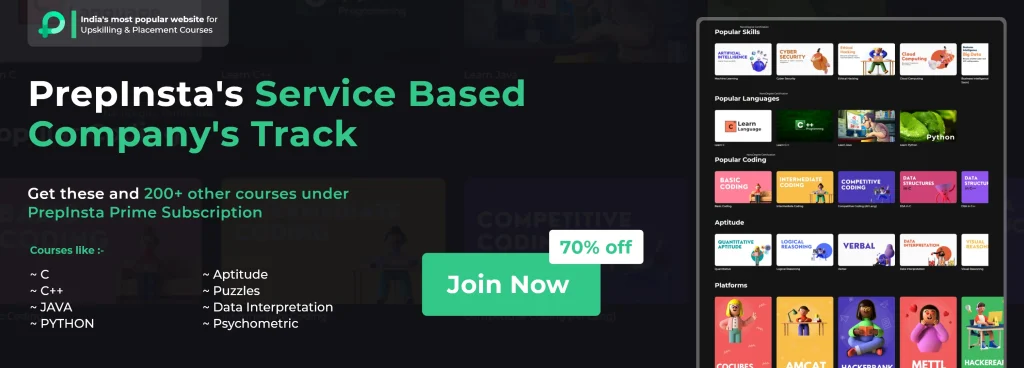Verbal Menu
- Basic Grammar
- Speech and Voices
- Tenses
- Articles
- Tenses and Articles
- Idioms and Phrases
- Subject Verb Agreement
- Prepositions and Conjunction
- Selecting Words
- Relative Pronoun
- Sentence Completion
- Sentence Ordering
- Contextual Vocabulary
- Jumbled Sentence
- Sentence Formation
- Error Identification
- Sentence Improvement and Construction
- Cloze Test
- Fill in the blanks
- Paragraph Ordering
- Para Jumbles
- Synonyms and Antonyms
- Synonyms
- Antonyms
- Reading Comprehension
- Get Off-campus Drive Updates
- Get Hiring Updates
- Contact US
PREPINSTA PRIME
Tips And Tricks And Shortcuts For Contextual Vocabulary
Tips and Tricks and Shortcuts For Contextual Vocabulary
Contextual Vocabulary means identifying the best meaning of word in passage or in sentence of the problems. You can be asked to reflect either the synonym or the antonym of the word or relate the word with the options that fits perfectly as an alternative in the context without changing the meaning of the sentence or the passage. Here are some Tips and Tricks and Shortcuts for Contextual Vocabulary :
Why Contextual Vocabulary is Important?- It is the best way to learn new words
- helps to not only improve vocabulary but also to guides on how to apply these words in new sentences or quotes or any set conversation.

Tips and Tricks and Shortcuts For Contextual Vocabulary
1. Latin Keyword Method –
The Latin keyword method means to know the reference of any word in Latin terms. Once you know its meaning it gets easier for you to guess the context of the passage or sentence and choose the words accordingly to replace the one in the question as directed.
For example – words like –
- Quid pro quo – something for something.
- Ad hoc – to this.
- Verbatim – In exactly the same words
- Seismic
(a) Seismology is study of earthquake.
(b) Seismologists is the person who study Earthquake.
2. Associative Method –
Just as the name might ring a bell, Associative method means to associate a word with any event, picture, thing or something relatable. This way you can remember more number of words without worrying to memorize each of them.
For Example – PLETHORA
Now to associate Plethora with something you need to know its meaning which means ‘In abundance’ or ‘Many’.
So now you know two more words that you can associate with plethora and you can guess many more words which can be a combination of simple and complex words, per say-
- Abundance
- Many
- Several
- Excess
- Surfeit
- Profusion ………….. and so on.
3. Parent Tree Method –
This method is again a boon for those who struggle at remembering synonyms and antonyms of endless words in the dictionary. As the name might mean, Parent tree method means to have one PARENT word and then clip more words to it like leaves and branches that mean the same or have similar meaning.
For Example-
Take a word that you want to find more similar words for, maybe ‘FIGHT’. So make a point that whenever you come across any other word that relates to the meaning of ‘FIGHT’, your parent word, note it down. This way you can get a book full words only with very little study.
Some common related words to fight are –
- Brawl
- Struggle
- Competition
- Combat
- Dispute
- Challenge
- Wrestle
- Resist …………………………. and so on.
4. Suffix/ Prefix Method –
There are ample number of words in English dictionary that do not have keywords, so we use the Prefix and Suffix method to give them a shorter meaning and still be able to relate to the main word. Prefix means the initial letters of a word while Suffix means the last few alphabets that can be used to denote it in longer sentences.
For Example – Let’s take a prefix as ‘PRO’ – means and expert. Now count the number of words which can start with Pro:
- Proactive
- Profess
- Program
- Promote
- Prolong
- Provincial
- Pronoun ……………. and so now. The list is inexhaustible.
Example – Let’s try the same thing with a suffix now. Say, ‘NESS’ – A state or quality. So our list goes like –
- Coolness
- Darkness
- Dryness
- Boldness
- Fitness
- Kindness ………………. and so one. Inexhaustible once again.
Tips and Tricks and Shortcuts For Contextual Vocabulary : TYPES
The types of Contextual Vocabulary questions that can be asked during an assessment are divided into three categories. The questions for the same are given below:
- Passage-based questions.
- Sentence based questions.
- Antonym/Synonym based question
Prime Course Trailer
Related Banners
Get PrepInsta Prime & get Access to all 200+ courses offered by PrepInsta in One Subscription
Tips and Tricks and Shortcuts For Contextual Vocabulary
Type 1- Passage- Based Questions
In passage based question, there will be a given passage, and below the passage there will be the question. Now, you to find the meaning of that word in passage.
Question 1
Sam and his friends were watching a fiction movie, but one of his friends was teasing them all by revealing the suspense prior. Since he had already seen the movie. So, Sam asked him to leave the room and do something else. Since it was a suspensive movie, Sam did not want his friend to disclose the ending as; even a cursory glance will reveal the mystery.
What is the meaning of the word “cursory” in context to the above paragraph ?
Options:
A. Curious
B. Critical
C. Brief
D. Crude
Correct Option: C
Explanation: Since mystery is mentioned in the statement, hence a brief glance can also break it and cursory means brief. And curious means anxious, which is not suitable to fill the blank.
Crude is a sort of oil, which does not suit the sentence frame. Therefore option C is the correct one.
Type 2. Sentence based questions:
Here we will be given a sentence, and below that, we will be given the word, and our task is to find the meaning of that word in context to its usage in that particular sentence.
Question 1.
Health is too important to be foresaken.
Find the meaning of the term Foresaken in reference to the sentence mentioned above.
Options:
A. Detested
B. Despised
C. Discarded
D. Neglected
Correct option: D
Explanation: Since we’re talking about health here, hence verbs like discarded (meaning to get rid of), despised and detested (meaning to hate someone) cannot be used, as they do not sit the sentence frame.
Type 3. Antonym/Synonym based questions-
The third and the last type of contextual vocabulary questions is antonym and synonym based questions. Here we will be given a word and shall be asked to find either its meaning (In case of Synonym) or its opposite (In case of antonym).
This is better explained with the help of an example below:
Question 1.
Find the word which best expresses the meaning of the word:
Multifarious
Options:
A. Diverse
B. Homogeneous
C. Consistent
D. Alike
Correct option: A
Explanation: By splitting Multifarious, we get multi as a prefix which means many. But the possibilities have words like homogeneous, which has homo as a prefix which means one or single, next is consistent which means same or regular, and alike again means similar. All these three options cannot be relatable to the given the word.
However Diverse, which means different or multi, carry a similar meaning to the given the word. Hence option A is the correct one.
Also Check Out
Get over 200+ course One Subscription
Courses like AI/ML, Cloud Computing, Ethical Hacking, C, C++, Java, Python, DSA (All Languages), Competitive Coding (All Languages), TCS, Infosys, Wipro, Amazon, DBMS, SQL and others
- Sentence Ordering – Questions | Rules | How to Solve Quickly | Tricks & Shortcuts
- Jumbled Sentence – Questions | Rules | How to Solve Quickly | Tricks & Shortcuts
- Sentence Formation – Questions | Rules | How to Solve Quickly | Tricks & Shortcuts
- Error Identification – Questions | Rules | How to Solve Quickly | Tricks & Shortcuts
- Sentence Improvement and Construction – Questions | Rules | How to Solve Quickly | Tricks & Shortcuts
- Sentence Ordering – Questions |
Rules |
How to Solve Quickly |
Tricks & Shortcuts - Jumbled Sentence – Questions |
Rules |
How to Solve Quickly |
Tricks & Shortcuts - Sentence Formation – Questions |
Rules |
How to Solve Quickly |
Tricks & Shortcuts - Error Identification – Questions |
Rules |
How to Solve Quickly |
Tricks & Shortcuts - Sentence Improvement and Construction – Questions |
Rules |
How to Solve Quickly |
Tricks & Shortcuts

 Apply For Jobs
Apply For Jobs Get Hiring Updates
Get Hiring Updates




Login/Signup to comment